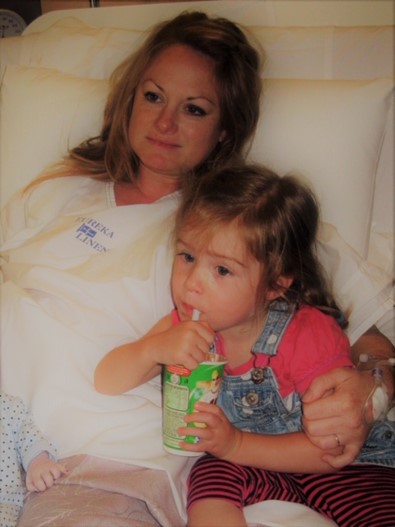
It was a perfectly healthy, normal pregnancy
“I gave birth to my first child, my daughter Starja in 2008, by emergency caesarean. With my second pregnancy I wanted a natural birth. This was my biggest focus, and I had nothing else to worry about.
“At the hospital, I laboured for a long time for a natural birth. But, after a while, the doctors said they had to do an emergency caesarean.
“After my son was born they told us he wasn’t breathing very well on his own and they wanted to work on him.
“My husband and I thought he would be OK, because you see that all the time on TV shows – doctors and midwives working on the baby, and the baby is always perfectly fine.
We’re very sorry, but your baby boy has died
“During the caesarean, the doctor had also cut my ureter tube. I was kept on the operating table for another few hours after they told me my baby boy had died.
“I was in a deep, deep state of grief and shock.”
“All this time, while I was still on the table, the anaesthetists and nurses had to look after me, and wait with me, while my husband was outside with our son.
“The anaesthetist, she was young, and I don’t think she had been in the job for very long.
“But she was amazing. She came to see how I was two days later. She sat on the side of my bed and we both just cried and cried and cried.
“To know that what we had been through had touched the health professionals in the room so deeply really helped me grieve.”
“It was gut-wrenching to walk out of those hospital doors without our son.
“My friends and family were great, but in time they moved on, back to normality. They just didn’t know what to do.
“I couldn’t go back to normality. My baby had died and the pain wouldn’t just go away.”
Red Nose became a part of my life
“Red Nose Counsellors came to our home a few times to visit, and then my husband and I started going to the support groups.
“The support groups, there is nothing like them. Every month I would hang out for those meetings. It was a safe place to talk about my baby without judgement. I could be upset there.
“In the early years, all I was doing was trying to cope and survive and be a mum to my daughter, who was two. She was everything, my reason to get out of bed every day.
“When I got the all-clear to start trying again, I joined the subsequent pregnancy groups. These groups were also a safe place, and they really held us as we travelled through the grief.
“If you get the right support at the right time it helps you to keep going.
Breaking down the stillbirth stigma and educating others
“After a stillbirth, you lose so much. You no longer have that innocent bliss around pregnancy and birth because you have suffered such a massive loss.
“You feel different to all the other mums and you feel judged if you want to talk about your baby that died ‘is she still going on about it’.
“There’s a lack of education in the wider community about what a stillbirth is. Often friends and family, didn’t get to meet your baby, so it makes it easier for people to pretend your baby never existed.
“You go from the highest high in life to the lowest of lows. It’s devastating.
Be warm, be real, be you
“These days, I share my story alongside Red Nose Counsellors to educate hospital staff, who also struggle with knowing what to do when they are in that room with a mother who has lost a child.
“What drives me is connecting with people, by sharing my experience of grief and loss and my baby boy Liev. And in doing this hopefully helping others – it’s an absolute privilege.
“When some of the doctors and midwifes say to me how much my presentation has helped them to be there for someone at the worst time in their lives it means an enormous amount to me.
“Be warm, Be real, Be you.” This is my favourite saying when speaking to health professionals.
“Step up and be there for that person. There’s nothing you can say to make it better or change the fact that their baby has died so just connect in and be you.”
Red Nose Grief and Loss provides free, specialised support for anybody impacted by the death of a child. Call our 24/7 Support line on 1300 308 307 or visit rednosegriefandloss.org.au

